News 2012
December 2012
ITRC Micro conference at the University of Iceland
Monday 10th December the ITRC will host a micro conference at the main auditorium at the University of Iceland. The concept was initiated by the ITRC and entails a 1 hour session, where academics present their thoughts to industry on current topical issues in a 5 minute presentation without slides. The first of these to be held was in year 2011 and was a resounding success with over 100 industry stakeholders coming.
This year the conference will deal with questions around how much is enough and if there are indications of the local population being in some way uncomfortable with the massive growth of visitor numbers to the island. In the wake of the infamous Eyjafjallajökull eruption, numbers of visitors have increased by 15% per annum and in 2012 in total over 700.000 people will visit Iceland (pop. 320.000). To some this is cause for concern, other see only opportunities and look forward to 2.000.000 visitors by the end of the decade as the president of Iceland predicted in summer 2012. In this years micro-conference critical concerns will be raised and discussed with industry stakeholders.
October 2012
ITRC opens offices in Reykjavík
The Icelandic Tourism Research Centre has now opened an office in the capital of Iceland, Reykjavík. The office is at the University of Iceland in the natural sciences building called Askja. There the department of geography and tourism is also housed and the idea is to ensure synergies and collaboration with tourism scholars at the department. Eyrún J. Bjarnadóttir and dr. Helga Kristjánsdóttir, both researchers at the ITRC, will be at the Reykjavík office.
September 2012
ITRC research seminar in Höfn a success
The Icelandic Tourism Research Centre hosted a research seminar in Höfn (SE Iceland) from 19th to 21st September in order to kick start the five projects that got funding from the board of the ITRC at the annual meeting in May 2012 (list of funded projects). The aim of the seminar was to get the projects on their way and get them introduced to each other and the people behind them. Before the meeting, each of the project managers was asked to complete a detailed overview of the project’s proposed progress, which was then used to introduce the project and not least seek synergies between the different projects. Below a few pictures follow that explain what took place in Höfn. Pictures courtesy of Rögnvaldur Ólafsson.
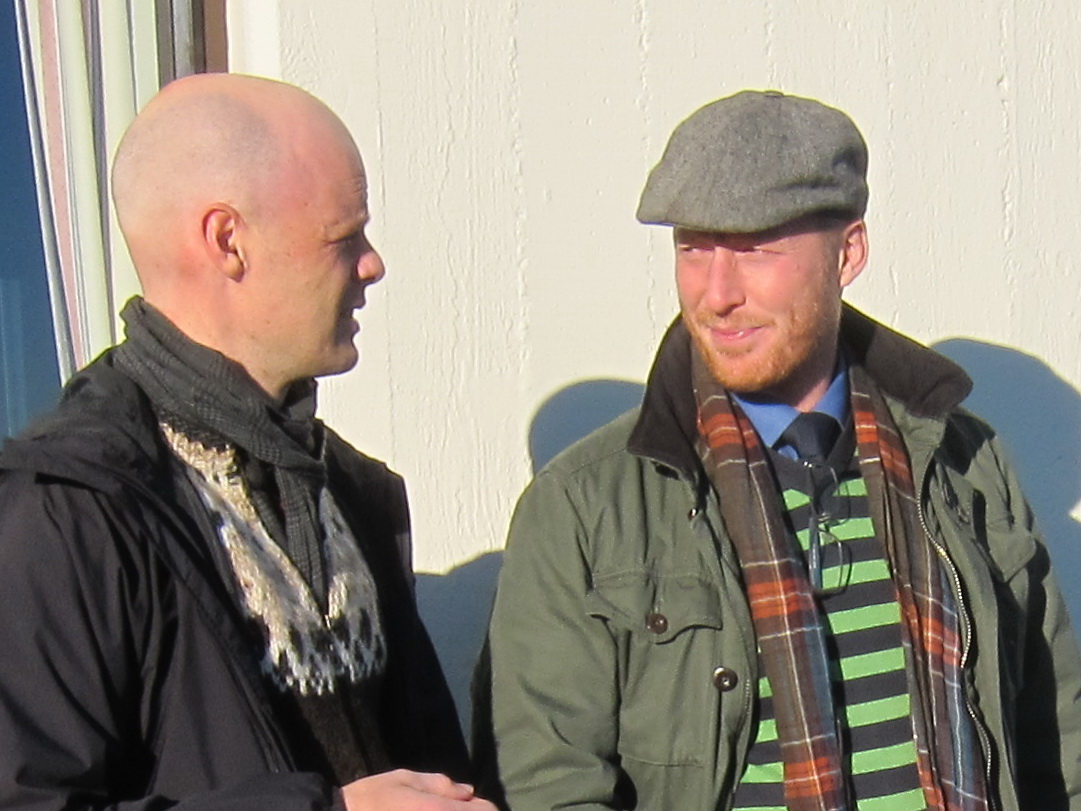
Many things needed to be discussed in detail and prepared in order to ensure the quality of the work. Here Gunnar Þór Jóhannesson (left), supervising a project on cultural tourism development, and the director of the ITRC Edward H. Huijbens (right) go over matters.
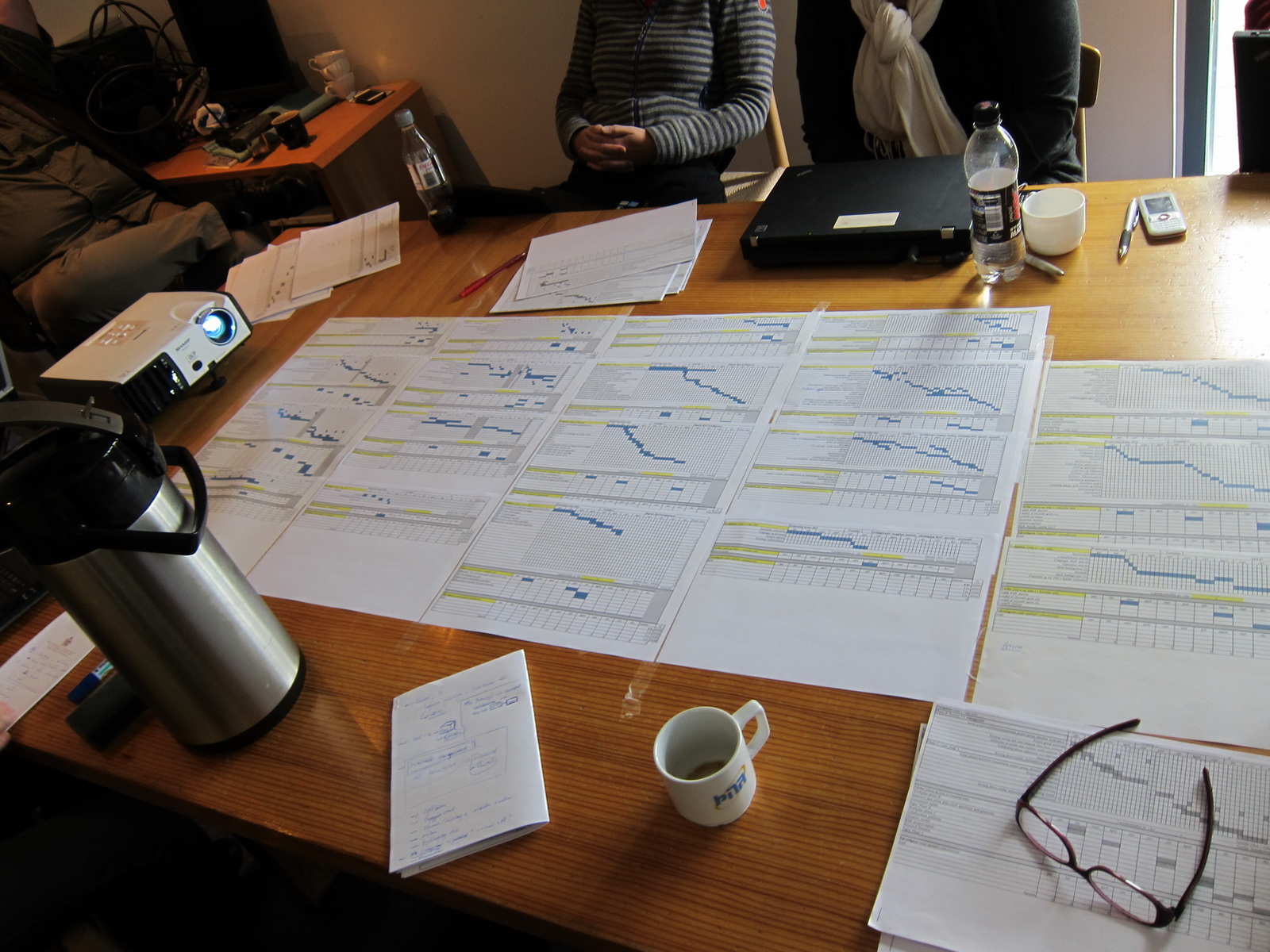
Here project synergies are sought with the help of a detailed overview of each project’s proposed progress.
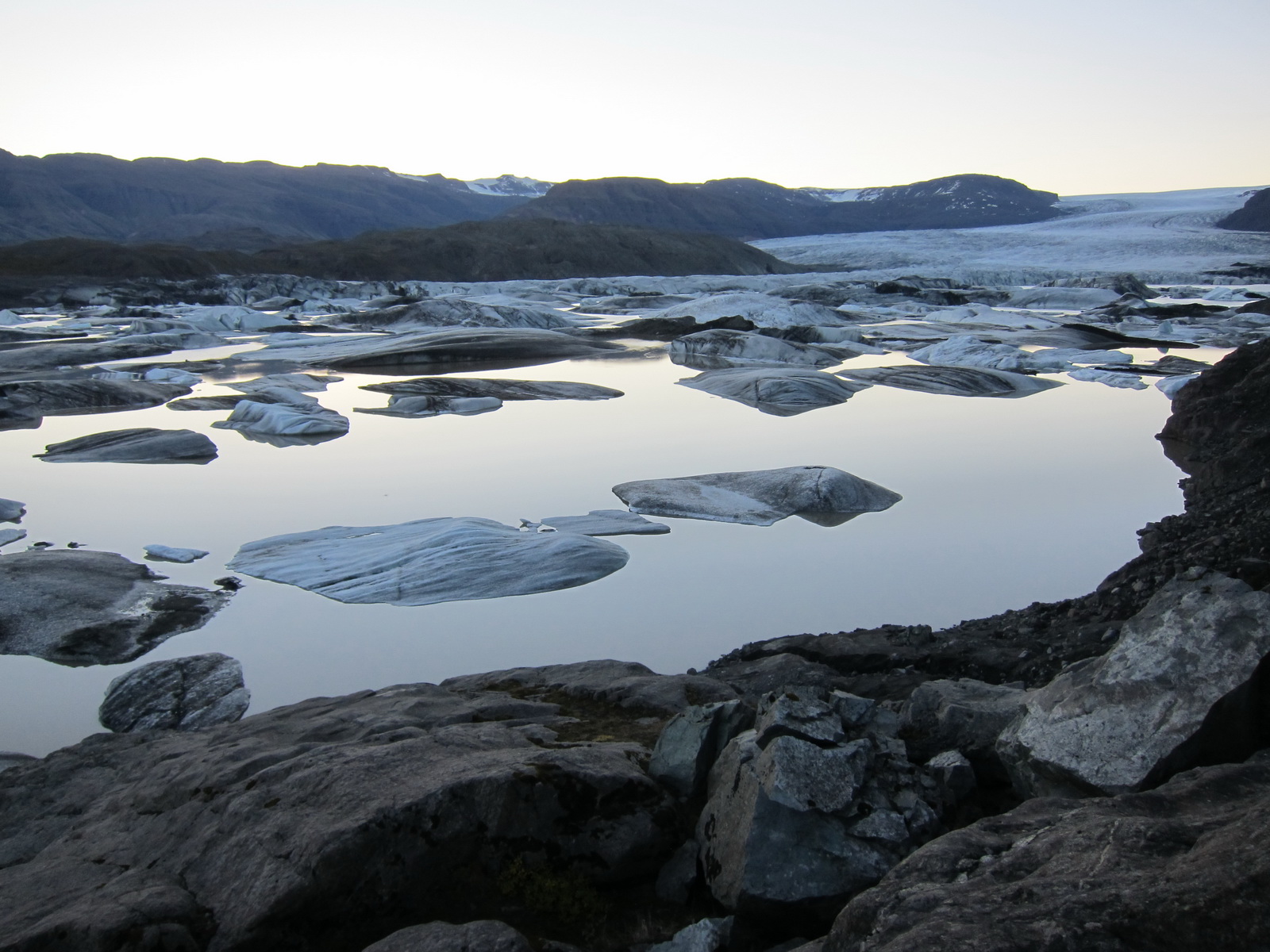
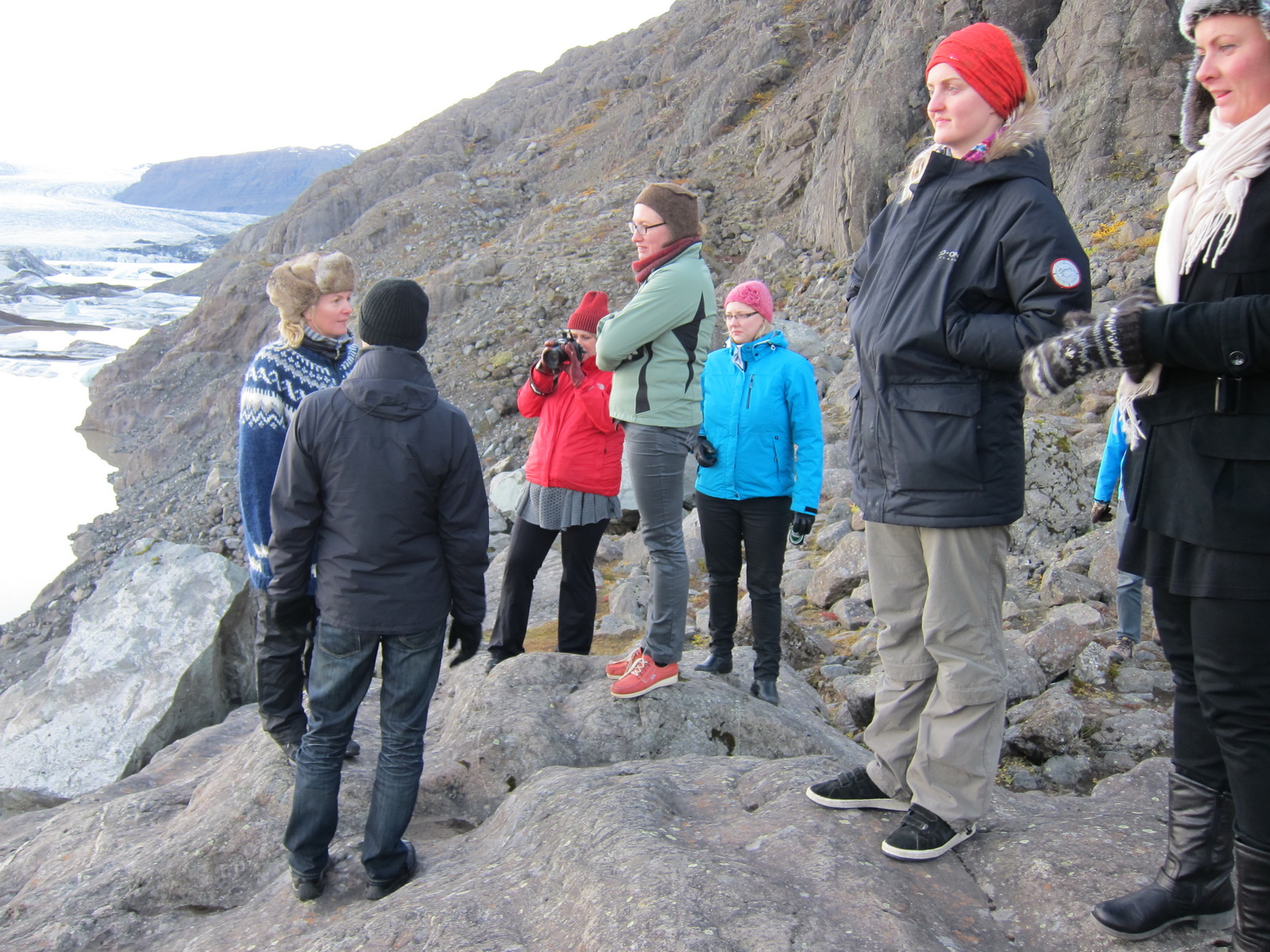
Part of what was discussed is Icelandic nature, national parks and protected areas. Here part of the group marvels at the Hoffellslón lagoon guided by Hjalti Þór Vignisson, mayor of Höfn (in front).
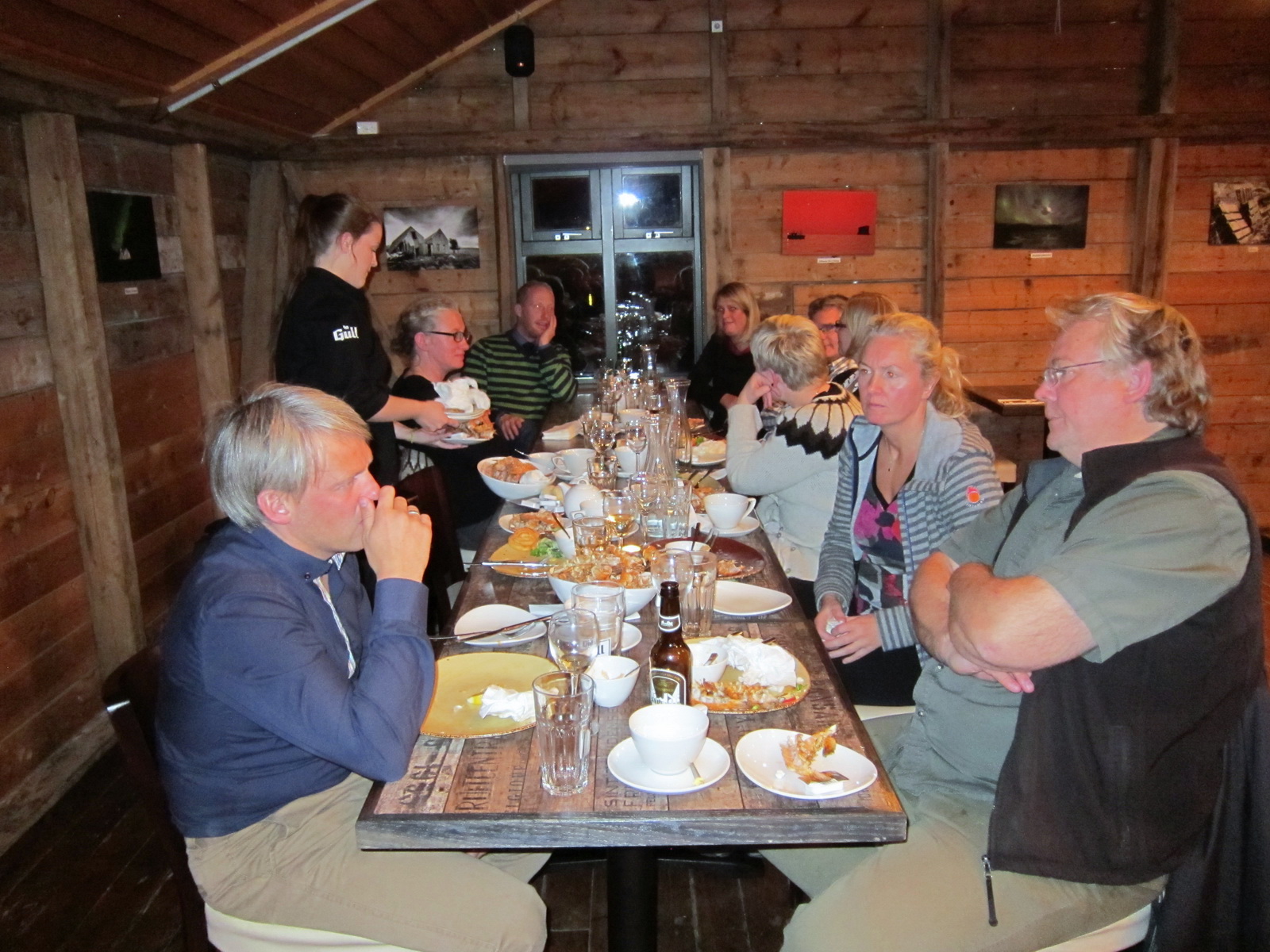
Local food and delicacies are often the key to good tourism services. Here the group enjoys local langoustine at the restaurant Pakkhúsið in Höfn and discusses tourism research in a more informal manner.
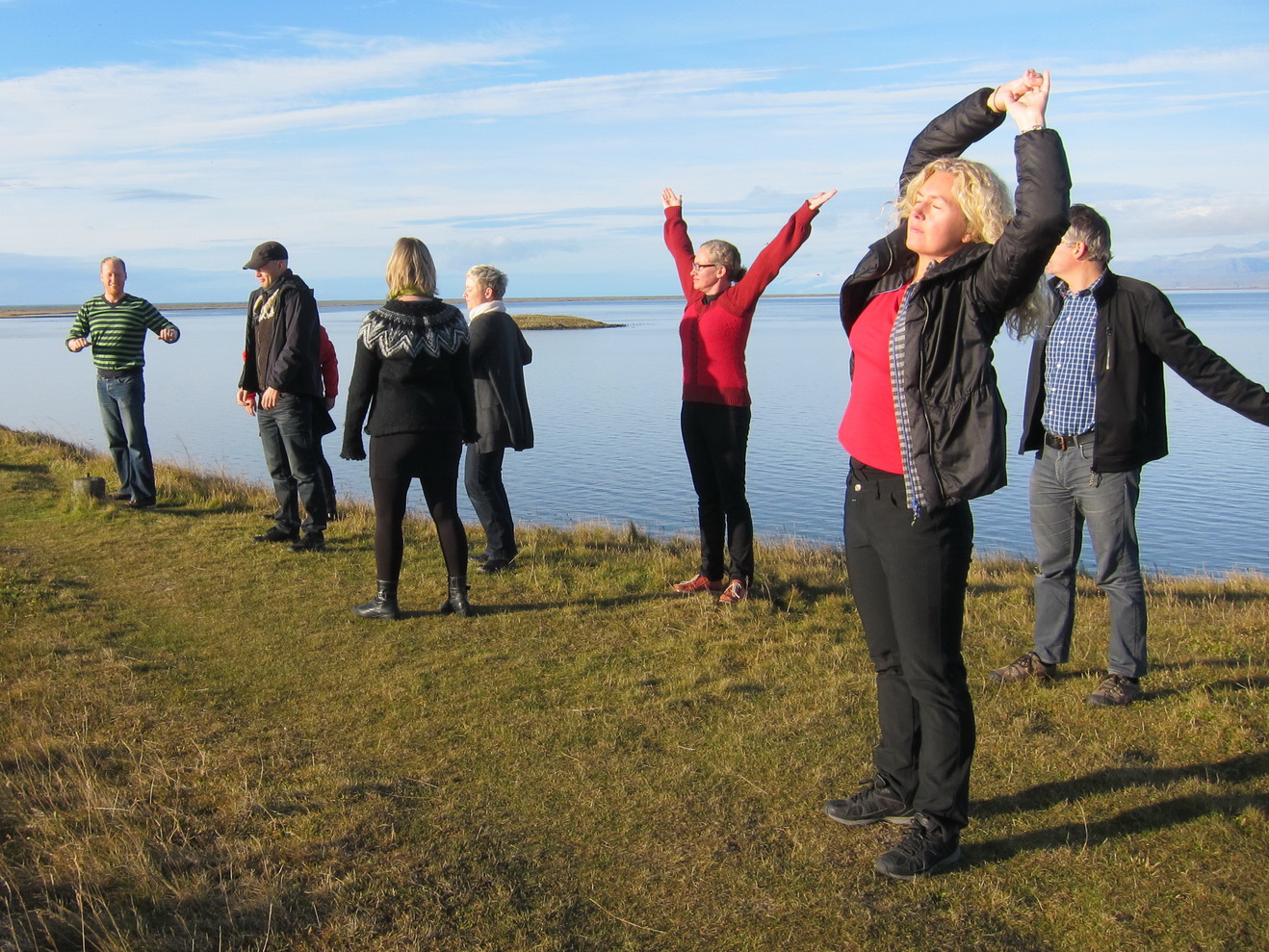
Some exercise is needed before sitting down for the day.
August 2012
ITRC involved in Leonardo
ITRC involved in EU‘s Leonardo funding practical projects in the field of vocational education and training . Through collaboration with institutions of higher education in Poland, Rumania, Bulgaria and Turkey, the aim is to facilitate mutual learning and sharing of best practices in tourism development in the respective countries. The focus will be especially on health and wellbeing tourism. The grant awarded to the ITRC covers 12 trips in the period 2012-2014.
July 2012
ITRC involved in COST project
The European Union (EU) facilitates cooperation in science and technology, through one of its longest standing grant allocation frameworks, COST. As of early June the Icelandic Tourism Research Centre along with representatives from higher education institutes in 19 other countries were granted support through the framework. The COST Action entered into force on 25th June and is entitled Tourism, Wellbeing and Ecosystem Services (TObeWELL).
This project, led by the University of Exeter, is based on bringing together principles of ecosystem services (ES), which focus on life support systems, with more non-material services such as culture, health and wellbeing through tourism. It aims to link research on wellbeing provided by ecosystems and their use via tourism, leisure and recreation activities. The underpinning issue of this proposal is to produce new and collaborative research on how and in what way can tourism be a catalyst for improving human health and wellbeing, by using in a symbiotic and sustainable way natural resources and services provided by ecosystems, as well as exploring the challenges of (e)valuation of such services. This will be achieved by creating a collaborative European network of research centres based around four key working groups, namely (a) theoretical relationships between tourism, wellbeing and ES ; (b) empirical and methodological research challenges and approaches; (c) interrelations between ageing, wellbeing and ES; and (d) policy frameworks’ analysis and research-informed policy making.
June 2012
Big day for Icelandic tourism
Today, June 18th, is the biggest day ever in Icelandic tourism in terms of visitor numbers. 7.000 passengers disembarked of cruise ships in Reykjavík today and with them over 1.000 members of crew. In addition 7.000 passengers arrived by air today only. On this big day it is fitting to contemplate issues and development of tourism on the island. To this end the director of the ITRC and Gunnar Thór Jóhannesson, assistant professor of tourism at the University of Iceland, have today signed a book contract with Iceland's largest publishing house; Forlagið. The authors, Edward H. Huijbens and Gunnar Thór Jóhannesson) deal in the book with tourism in Iceland, its economic and environmental impact, and how tourism interacts with society and culture. The book is intended for wide audience of both undergraduate students of tourism and industry stakeholders. The book is due in summer 2013 and will be promoted nation-wide by the authors.
May 2012
Five projects funded by the ITRC
The board of the Icelandic Tourism Research Centre has decided to support five project ideas proposed in relations to an advertposted in March. A total of 11 project ideas were proposed and thereof the director of the ITRC has been granted permission to negotiate the terms of a full project with five. These five projects are:
- Tourism and peripheral communities – impacts and consequences
- The economic benefits of tourism
- Tourism carrying capacity
- Sustaining Tourism in Protected Areas in Iceland
- Rural tourism development in Iceland
The projects reflect well the threefold emphasis of the ITRC research agendas, focusing on economic impacts and the interplay between society/culture, nature and tourism. The project are focused on regions in the periphery of Iceland as well as the country as a whole and selected nature-based tourism destinations. Those behind the projects represent the breadth of the institutes that back the ITRC.
Below short abstracts for each project are provided in the order in which they are listed.
Tourism and peripheral communities – impacts and consequences
The project, which is the PhD study of Guðrún Þóra Gunnarsdóttir, deals with the impact of tourism in peripheral communities in Iceland. The aim of the project is to study the making of a destination and how this process affects the understanding of the local population on their community, their environment and history. Three peripheral areas in Iceland, all suffering from industry restructuring traditional means of sustenance through agriculture and fisheries. They have all responded by going into tourism in the last few years. The project is to run from 2011 to 2014 and is meant to inform tourism businesses and policy makers on the potential rewards of tourism development, but also the pitfalls to be aware of.
The economic benefits of tourism
The project is proposed jointly by the ITRC and Statistics Iceland and is meant to boost the tourism satellite accounts, being compiled by the latter. The idea is to fund one PhD student to delve into the preconditions and definitions being used in the TSA in the Icelandic context, analyse the industry structure and business environment of Icelandic tourism and see how possibly to connect other information and data being compiled on Icelandic tourism in a comprehensive overview of the industry. This would be an overview accessible on an annual basis to industry stakeholders.
Tourism carrying capacity
Over a decade ago tourism carrying capacity research was undertaken in selected nature-based tourism destinations in Iceland. The idea, proposed by the researcher of these Anna Dóra Sæþórsdóttir, is to revisit these areas with the same type of surveying and research framework today, although focusing only on the perception of visitors. By now the number of visitors to these areas has more than doubled and it is imperative to realize how possibly this has impacted the views of visiting tourists, infrastructure development, local attitudes and the environment in these destinations.
Sustaining Tourism in Protected Areas in Iceland
The central goal of this project is to design a framework for the development of sustainable tourism in and around Vatnajökull National Park (VNP). Protected areas – especially national parks – are an important foundation of tourism in Iceland. The project is a PhD project supervised by the University of Iceland centre in Hornafjörður. A large majority of the tourists who choose to visit Iceland do so because of the possibility of experiencing wild, untouched nature. The establishment of VNP, the largest in Europe, in 2008 was both a response to the existing and ever-increasing demand for nature-based recreation and an active attempt to stimulate visits to the park and its surrounding areas even further. By attracting more tourists, the park would increase economic benefits for local and national tourism businesses and thus also providing much-needed opportunities for socio-economic development in the rural areas surrounding the park, most of whom were suffering from stagnation and de-population. The central aims of this project are:
a. Develop and test a participatory modelling framework on basis of an adaptive co-management approach which contributes to the development and the viability of sustainable park tourism.
b. Critically evaluate the effectiveness of collaborative modelling processes in developing and planning sustainable tourism in national parks in Iceland
Rural tourism development in Iceland
This project, proposed by the University of Iceland centre in Húsavík, is to explore the economic impact of tourism in a rural setting outside the capital region and do a region by region comparison. The research will focus on the supply and demand of tourism in each region through survey work, researching visitors, industry service providers and through and infrastructure mapping focusing on e.g. the role of transport.
Research grants from the ITRC
Following the strategy formulation of the board of the ITRC and associated partners in February 2012, the ITRC has now advertised for research projects to fund and participate in. The projects need to be supervised at one of the Universities in Iceland in collaboration with the ITRC and entail post graduate opportunities. Great emphasis is placed on the practical dimension of the project, i.e. translating research findings for the business community and public sector policy makers. The funding can be for up to three years, with up to 5 milllion ISK allocated per year. The detailed advert is here in Icelandic.
March 2012
The policy and vision of ITRC
In the new year the board of the ITRC along with 15 other stakeholders from tourism’s public and private sector in Iceland formulated a strategy and vision for tourism research in Iceland and how possibly to position the ITRC therein. An employee of the Federation of Icelandic Industries led the work, but he also led the strategy and vision for redressing seasonality in Icelandic tourism with industry stakeholders. Two meetings have been held in this strategy work. A workshop session 10th – 11th February and presentation of workshop findings 2nd March. Now the board of the ITRC will during the annual meeting to be held 20th March, take these findings and position the vision and policy of the ITRC therein.
February 2012
ITRC intern student's testimony
The ITRC through an agreement with Wageningen University in the Netherlands, hosts internship students each semester. Lusine Margaryan was with the ITRC last autumn and here a testimony of her experience can be read:
http://www.mle.wur.nl/UK/Student+testimonials/Internship+experiences/Lusine/
11th Global Forum on Tourism Statistics,
to be held from 14 to 16 November 2012 in Reykjavík, Iceland.
CALL FOR PAPERS
The deadline to submit abstracts is 30 April 2012
| Statistics Iceland, the Icelandic Ministry of Energy, Industry and Tourism, the Organisation for Economic Co-operation and Development (OECD), and the Statistical Office of the European Union (EUROSTAT) are pleased to announce the 11th Global Forum on Tourism Statistics, to be held from 14 to 16 November 2012 in Reykjavík, Iceland. | ||||||||
| The Global Forum on Tourism Statistics (formerly known as International Forum) has been providing since 1994 a unique platform for the regular exchange of views and experiences on developments in tourism statistics. The aim is to discuss major technical issues concerning the establishment of harmonised tourism statistics in an environment that strengthens co-operation among governments, the private sector, researchers, academics, OECD and EU member and non-member countries and international organisations. The next Forum will focus on the following themes: i) Seasonality in tourism; ii) Tourism statistics in the 21st century; iii) Use of tourism satellite accounts for business decisions and policy making; iv) Effects of external shocks (in particular the economic and financial turmoil) on tourism and tourism statistics; and v) Coherence and comparability of tourism statistics. Detailed information is available in Annex 1 to this letter. This is a CALL FOR PAPERS as the success of the Forum will largely depend on your contributions. Authors are requested to strictly follow the guidelines presented in Annex 2. The deadline to submit abstracts is 30 April 2012. The organising committee (OECD, EUROSTAT and the Icelandic organisers) will review the proposal in May 2012. The final programme of the Forum will be made available during summer, after the authors of the selected abstracts have been invited to submit their full papers. The deadline for submission of full papers is 30th September 2012. All the documentation (abstracts, papers and presentations) should be in English, which will be the unique working language during the Forum. |
||||||||
| Abstracts and papers from the previous Forum (2010) can be consulted on http://10thtourismstatisticsforum.ine.pt |
||||||||
| Annex 1 | ||||||||
| Core themes of discussion for the Call for Papers | ||||||||
| The 11th Global Forum on Tourism Statistics will focus on the five themes listed below. It will examine current and future developments relating to these themes and their relevance to government and business decision‐ making. The aim is to ensure that the conclusions drawn from the discussions lead to new improvements in tourism‐related statistics and information, for example in terms of ease of use, comparability and availability. Besides the five vertical themes listed below, a number of highly‐relevant cross-cutting horizontal topics have been identified that can be touched upon in the different sessions: | ||||||||
|
||||||||
| Abstracts/papers integrating some of the above horizontal topics are strongly encouraged. | ||||||||
| THEME 1: SEASONALITY IN TOURISM |
||||||||
| Combating seasonality and prolonging the tourism season are important pillars of a sustainable and competitive tourism sector. Seasonality has an effect on the sectors potential of creating more and better jobs and on infrastructure related needs such as accommodation capacity, public transport and traffic planning. This session aims to provide empirical and methodological insights into how to measure the different dimensions of seasonality (visitors, expenditure, traffic, employment, etc). Furthermore emphasis is placed on the geography of seasonality and those niche tourism segments which offset seasonality: how can we measure regional seasonal disparities and scale the aforementioned dimensions, or how to monitor unconventional niche tourism? Seasonality is dictated by weather, climate, the social scheduling of our society, accessibility or simply inertia through habit. The session also invites papers that focus on definitions and causality of seasonality. What are the problems associated with seasonality and which are the current trends? Is seasonality a burden or a welcome respite from a busy high season? How can seasonality possibly be mitigated? Finally, this session can also go into methodological and conceptual issues related to seasonal adjustment in tourism statistics. | ||||||||
| Keywords: seasonality, measurement, definitions, causality, geography, niche markets, seasonal adjustment. | ||||||||
| THEME 2: TOURISM STATISTICS IN THE 21ST CENTURY |
||||||||
| Innovation in collecting and compiling tourism statistics is the way forward to match growing users with calls to reduce the burden on respondents and administrations. On the one hand, recent technological changes and the digital revolution of the past decades have opened interesting prospects. The quasi ubiquitous connectivity of travellers through mobile phones, GPS antennas or wireless internet means these same travellers leave a digital trace that has an analytical potential for tourism statistics. The use of mobile positioning data and credit card data is slowly but steadily entering the standard information package on tourism and travel, while the use of GPS‐based devices, web forms and automated data collection continues to replace traditional data collection and transmission techniques. The use of the internet as a data source via web scraping or analysis of trends on search engines or social networks is on the verge of a breakthrough. On the other hand, tourism statisticians need to optimise the re‐use of existing data from related domains to enrich the tourism analysis (e.g. to improve the coverage of SMEs) or to find synergies with other fields of statistics, for instance business registers, sectoral information from short‐term or structural business statistics, security or tax data. Any innovation should consider the obstacles and quality issues at stake. New approaches can reduce burden, improve timeliness or accuracy and even open new analytical possibilities, but technical and legal issues or quality‐related risks (comparability, continuity, etc) can also jeopardise their feasibility or even their suitability. | ||||||||
| Keywords: new technologies, mobile positioning, credit cards, gps, internet, social networks, direct electronic reporting, data linking, business registers, business statistics, timeliness, cost‐efficiency. | ||||||||
| THEME 3: HOW TO USE TOURISM STATISTICS AND TSA FOR BUSINESS DECISIONS AND POLICY MAKING |
||||||||
| The aim of this session is to provide a global insight about the use of the UN‐UNWTO‐OECD‐EUROSTAT Tourism Satellite Account: Recommended Methodological Framework (TSA:RMF) and to promote the development of a "common perspective" on the best ways to use the TSA. The TSA is the main internationally recognised standard to measure tourism in the economy. An increasing number of countries are implementing the TSA. This tool has the potential to be used by a wide range of public and private stakeholders. Its benefits are extensive, and include: tourism sector identification; assessment of tourism's contribution in the economy; quality benchmarking; and in addition, TSA extensions can provide information on indirect impacts, employment, and quarterly and regional data. Despite the many benefits, the TSA approach also has some well‐known limitations from the user's perspective, such as timeliness, the lack of a spatial dimension, and insufficient international comparability. This session will take the perspective of policy, business and statistical users. It will present country and industry examples of TSA uses, showing TSA based economic and social analyses at international, national and regional levels. It will provide illustrations of how the TSA can guide decision‐makers in their strategic choices, by supporting a better knowledge on tourism industry, infrastructure and labour market developments and a better understanding of inbound and domestic tourism. The session will also underline how TSA are used by statistical providers, for example to support the development of other satellite accounts. | ||||||||
| Keywords: tourism satellite accounts, decision making, structure of the tourism sector, TSA users, domestic tourism, employment, limitations on TSA use, indicators beyond TSA. | ||||||||
| THEME 4: EFFECTS OF EXTERNAL SHOCKS ON TOURISM AND ON TOURISM STATISTICS |
||||||||
| Recently, the economic and financial turmoil has had a tremendous impact on tourism, and on tourism statistics. The behaviour and preferences of tourists across the world changed, temporarily, or for good. The individual tourist has discovered new destinations – often domestic destinations ‐ and new, previously not used types of accommodation. From changing trends in demand and supply arises the need for new data or a new analytical framework. This session will take a look at the effects of the economic crisis on the tourists and on the tourism sector but also on the impact on the system of tourism statistics, i.e. the need for an enhanced system of tourism statistics to overcome observed shortcomings or methodological weaknesses. Additionally, the session will focus on the need for statistical information on supply and demand responses to other ‐ non‐financial and non‐economic ‐ shocks such as environmental disasters, climate change, health risks, political upheavals, wars or policy shifts. | ||||||||
| Keywords: economic crisis, disasters, social unrest, political unrest, external shocks, keeping tourism statistics user relevant. | ||||||||
| THEME 5: COHERENCE AND COMPARABILITY OF TOURISM STATISTICS |
||||||||
| Although all dimension of quality in statistics are equally relevant, this Forum will focus on the coherence and comparability. The European Statistical System's Handbook for Quality Reports1 states that "the coherence of two or more statistical outputs refers to the degree to which the statistical processes by which they were generated used the same concepts ‐ classifications, definitions, and target populations – and harmonised methods ; coherent statistical outputs have the potential to be validly combined and used jointly", while "comparability is a special case of coherence and refers to the case where the statistical outputs refer to the same data items and the aim of combining them is to make comparisons over time, or across regions, or across other domains". As tourism statistics often combines data from a wide range of sources (household surveys, business surveys, administrative records, etc.), coherence and comparability are critical issues for their quality. This session will look at the international comparability, the progress made in implementing the revised standards IRTS 2008 and TSA:RMF 2008 across countries, as well as challenges for comparability moving forward, i.e., setting the agenda for the next round of revisions to standards. Besides the general aspects of coherence, papers can also discuss the internal coherence and comparability of different outputs within a system of tourism statistics, for instance the impact of the recall bias in visitor surveys or of underreporting and under coverage in accommodation statistics. A specific sub‐topic for this session is the consistency between balance of payments statistics and tourism statistics, i.e. the harmonisation of methods and use of synergies in data sources for describing the different concepts of travel and tourism. | ||||||||
| Keywords: coverage & scope of observation, recall bias, internal coherence, comparability over time, comparability across countries/regions, coherence between infra‐annual and annual statistics, mirror statistics, travel item, balance of payments, coherence with sectoral business statistics, asymmetries. | ||||||||
| CROSS‐CUTTING HORIZONTAL TOPICS | ||||||||
| Because of their general nature and potential links with each of the five themes, no specific theme will be dedicated to these topics. Authors are nevertheless encourages to – where relevant and suitable – include employment in tourism, sustainability and competitiveness, same‐day visitors and SMEs in their analytical framework. Besides data on physical tourism flows (number of visitors, number of nights spent) and monetary flows (tourism expenditure, debit and credit of an economy), the potential of creation jobs and the quality of employment in the tourism sector remains at a constant high. In all phases of the business cycle, but especially in times of economic slowdown, the sustainability and competitiveness of the tourism sector is an essential concern for decision‐makers in the industry and for policy makers. The importance of same-day visits for the tourism sector can't be ignored. In the European countries where data is available, expenditure by same‐day visitors accounts on average for more than half of domestic tourism expenditure. The majority of businesses operating in the tourism sector are small or medium‐sized, and the strategic importance of SMEs in tourism lies in their economic value and their substantial job‐creation potential, but also in the stability and prosperity they can bring for local communities whilst safeguarding the local identity of destinations. |
January 2012
Is powerful marketing segmentation the tool to boost revenues?
Thursday 12th January Promote Iceland hosted a seminar on marketing techniques and the role and purpose of segmentation. The meeting was held at Grand hotel, Reykjavík from 13.00-15.00
Edward H. Huijbens, the director of the ITRC gave an opening presentation followed by the keynote speaker Will Harding from Canada Tourism Commission who introduced the tools and techniques the CTC has developed over the years.
Edward's presentation can be read here and the accompanying slides are here





 Norðurslóð 4 (7th floor)
Norðurslóð 4 (7th floor) 600 Akureyri, Iceland
600 Akureyri, Iceland